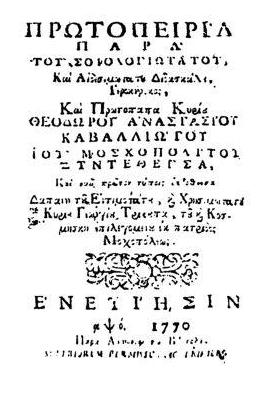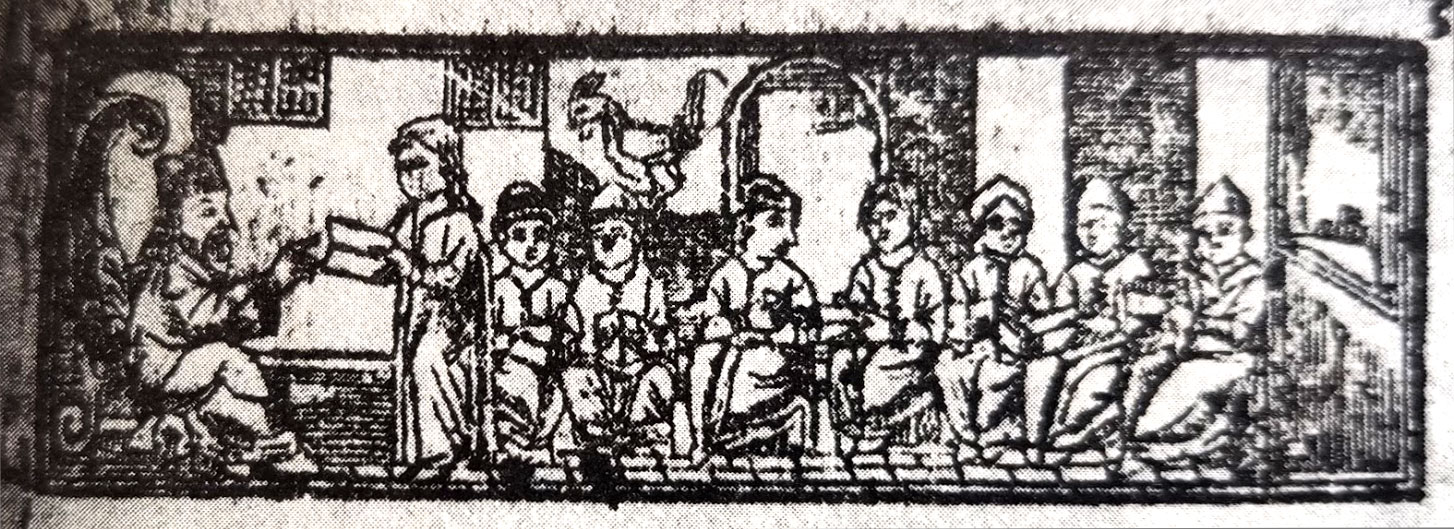Theodor Kavalioti on:
[Wikipedia]
[Google]
[Amazon]
 Theodore Anastasios Kavalliotis ( el, Θεόδωρος Αναστασίου Καβαλλιώτης; rup, Teodor Anastasie Cavalioti; sq, Theodor Kavalioti, 1718 – 11 August 1789) was a
Theodore Anastasios Kavalliotis ( el, Θεόδωρος Αναστασίου Καβαλλιώτης; rup, Teodor Anastasie Cavalioti; sq, Theodor Kavalioti, 1718 – 11 August 1789) was a
 He returned to Moscopole and was appointed teacher at the
He returned to Moscopole and was appointed teacher at the
Greek Orthodox
The term Greek Orthodox Church (Greek language, Greek: Ἑλληνορθόδοξη Ἐκκλησία, ''Ellinorthódoxi Ekklisía'', ) has two meanings. The broader meaning designates "the Eastern Orthodox Church, entire body of Orthodox (Chalced ...
priest, teacher and a figure of the Greek Enlightenment
The Modern Greek Enlightenment ( el, Διαφωτισμός, ''Diafotismos'', "enlightenment," "illumination"; also known as the Neo-Hellenic Enlightenment) was the Greek expression of the Age of Enlightenment.
Origins
The Greek Enlightenment w ...
. He is also known for having drafted an Aromanian–Greek–Albanian dictionary.
Early life
Theodoros Anastasiou Kavalliotis was born inKavala
Kavala ( el, Καβάλα, ''Kavála'' ) is a city in northern Greece, the principal seaport of eastern Macedonia and the capital of Kavala regional unit.
It is situated on the Bay of Kavala, across from the island of Thasos and on the Egnat ...
or Moscopole
Moscopole or Voskopoja ( sq, Voskopojë; rup, Moscopole, with several other variants; el, Μοσχόπολις, Moschopolis) is a village in Korçë County in southeastern Albania. During the 18th century, it was the cultural and commercial ...
, where he spent most of his life. He has been described variously as either Aromanian or Albanian
Albanian may refer to:
*Pertaining to Albania in Southeast Europe; in particular:
**Albanians, an ethnic group native to the Balkans
**Albanian language
**Albanian culture
**Demographics of Albania, includes other ethnic groups within the country ...
or Greek
Greek may refer to:
Greece
Anything of, from, or related to Greece, a country in Southern Europe:
*Greeks, an ethnic group.
*Greek language, a branch of the Indo-European language family.
**Proto-Greek language, the assumed last common ancestor ...
. Regardless, Kavalliotis had a Greek
Greek may refer to:
Greece
Anything of, from, or related to Greece, a country in Southern Europe:
*Greeks, an ethnic group.
*Greek language, a branch of the Indo-European language family.
**Proto-Greek language, the assumed last common ancestor ...
identity. He studied in Moscopole and later pursued higher studies in mathematical and philosophical sciences at the ''Maroutseios'' college in Ioannina
Ioannina ( el, Ιωάννινα ' ), often called Yannena ( ' ) within Greece, is the capital and largest city of the Ioannina regional unit and of Epirus, an administrative region in north-western Greece. According to the 2011 census, the c ...
(in 1732-1734), directed by Eugenios Voulgaris
Eugenios Voulgaris or Boulgaris ( gr, Εὐγένιος Βούλγαρης; russian: link=yes, Евгений Вулгарский, Евгений Вулгар; 1716–1806) was a Greek Orthodox cleric, author, educator, mathematician, astronome ...
.
Working period
 He returned to Moscopole and was appointed teacher at the
He returned to Moscopole and was appointed teacher at the New Academy
The Academy (Ancient Greek: Ἀκαδημία) was founded by Plato in c. 387 BC in Athens. Aristotle studied there for twenty years (367–347 BC) before founding his own school, the Lyceum. The Academy persisted throughout the Hellenistic p ...
( el, Νέα Ακαδημία ''Nea Akadimia'') in 1743. In 1750 he succeeded his former teacher Sevastos Leontiadis
Sevastos Leontiadis ( el, Σεβαστός Λεοντιάδης) was a Greek educationist who was most known as the director of the Kastoria school between 1726 and 1728.
He was born in Kastoria on 1690. He was student of Methodios Anthrakites in ...
and became director of the New Academy for more than 20 years (1748–1769).Κεκρίδης (1988), p. 283 His works, written in Greek, are ''Logic'' (1749, unpublished), ''Physics'' (1752, unpublished), ''Grammar'' of modern Greek (1760), ''Metaphysics'' (1767), ''Protopeiria'' (1770). They were used extensively and hand-made copies were found even as far as Iaşi, Romania. After the destruction of Moscopole at 1769, he probably went to Tokaj, Hungary, but returned at 1773.
In 1770, he published in Venice, at Antonio Bortoli's printing press, a school textbook, called ''Protopeiria''. ''Protopeiria'' is a 104 pages textbook which in pages 15–59 included a trilingual lexicon of 1,170 Greek, Aromanian, and Albanian words. This work aimed at the Hellenization
Hellenization (other British spelling Hellenisation) or Hellenism is the adoption of Greek culture, religion, language and identity by non-Greeks. In the ancient period, colonization often led to the Hellenization of indigenous peoples; in the ...
of the non-Greek-speaking Christian communities in the Balkans
The Balkans ( ), also known as the Balkan Peninsula, is a geographical area in southeastern Europe with various geographical and historical definitions. The region takes its name from the Balkan Mountains that stretch throughout the who ...
. The lexicon was re-published in 1774 by the Swedish professor Johann Thunmann
Johann Erich Thunmann or Johannes or Hans (23 August 1746 — 17 December 1778) was a linguist, historian and theologian born in Thoresund (Södermanland) in Sweden. He studied at Strängnäs and Uppsala then left Sweden to study at Greifswald. T ...
, who taught at the University of Halle-Wittenberg
Martin Luther University of Halle-Wittenberg (german: Martin-Luther-Universität Halle-Wittenberg), also referred to as MLU, is a public, research-oriented university in the cities of Halle and Wittenberg and the largest and oldest university i ...
. Thunmann added a Latin
Latin (, or , ) is a classical language belonging to the Italic branch of the Indo-European languages. Latin was originally a dialect spoken in the lower Tiber area (then known as Latium) around present-day Rome, but through the power of the ...
translation to the words in Greek, Aromanian, and Albanian.
Besides Eugenios Voulgaris, he was also influenced by the work of Vikentios Damodos
Vincent ( la, Vincentius) is a male given name derived from the Roman name Vincentius, which is derived from the Latin word (''to conquer'').
People with the given name Artists
*Vincent Apap (1909–2003), Maltese sculptor
*Vincent van Gogh ...
, Methodios Anthrakites
Methodios Anthrakites ( el, Μεθόδιος Ανθρακίτης; 1660–1736) was a Greek Orthodox cleric, author, educator, mathematician, astronomer, physicist, and philosopher.
He directed the Gioumeios and Epiphaneios Schools in Ioannina. ...
, René Descartes
René Descartes ( or ; ; Latinized: Renatus Cartesius; 31 March 1596 – 11 February 1650) was a French philosopher, scientist, and mathematician, widely considered a seminal figure in the emergence of modern philosophy and science. Mathem ...
, and medieval scholastics
Scholasticism was a medieval school of philosophy that employed a critical organic method of philosophical analysis predicated upon the Aristotelian 10 Categories. Christian scholasticism emerged within the monastic schools that translate ...
.
Kavalliotis couldn't manage to reestablish the destroyed New Academy. During his last months he witnessed another wave of destruction of his home place, in June 1789 by local Muslim lords. Kavalliotis died at August 11, 1789, aged 71.Kekridis (1989): p. 68
Sample from the first page of the Lexicon
Works
*Εἰσαγωγὴ εἰς τὰ ὀκτω μέρη τοῦ λόγου. Ἐν Μοσχοπόλει 1760 καὶ Ἑνετίῃσι 1774. *Ἔπη πρὸς τὸν ἐξαρχικῶν ἐν Μοσχοπόλει ἐπιδημήσαντα Ἰωαννίκιον Χαλκηδόνος ἐν ἔτει 1750 Μαΐου 2. *Πρωτοπειρία. (''Starting out'') Ἑνετίῃσιν, 1770. Παρὰ Ἀντωνίῳ τῷ Βόρτολι. Superiorum permissu. Ac privilegio.References
Sources
* * * {{DEFAULTSORT:Kavalliotis, Theodore Lexicographers Greek Eastern Orthodox priests Aromanian priests Albanian language Aromanians from the Ottoman Empire Pro-Greek Aromanians Greeks from the Ottoman Empire 1718 births 1789 deaths People of the Modern Greek Enlightenment People from Moscopole Maroutsaia School alumni 18th-century Eastern Orthodox priests People from Kavala 18th-century Albanian people 18th-century Albanian writers 18th-century Greek educators 18th-century Greek writers 18th-century lexicographers